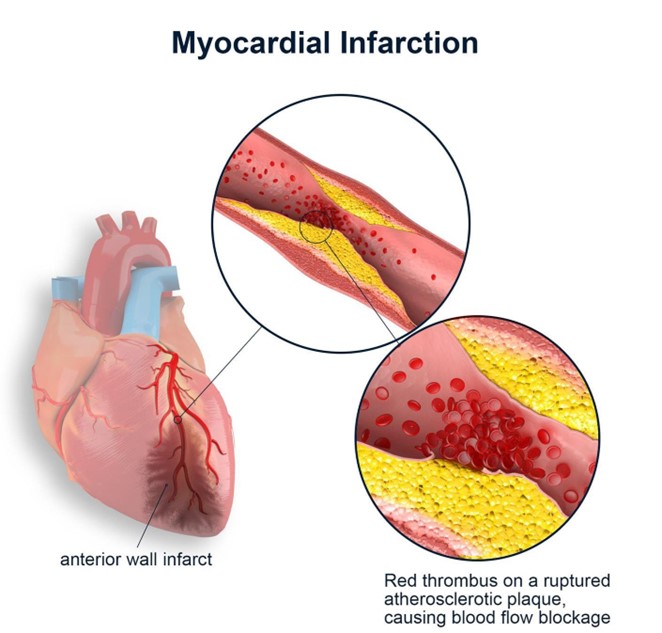A nurse is caring for a client who is experiencing hypovolemic shock. Which of the following blood products should the nurse anticipate administering to this client?
Packed RBCs
Cryoprecipitates
Albumin
Platelets
The Correct Answer is A
Choice A Reason: Packed RBCs are indicated for clients who have hypovolemic shock due to blood loss, as they increase the oxygen-carrying capacity of the blood and restore the blood volume.
Choice B Reason: Cryoprecipitates are indicated for clients who have hemophilia or von Willebrand disease, as they contain clotting factors that help stop bleeding.
Choice C Reason: Albumin is indicated for clients who have hypovolemic shock due to fluid loss, such as from burns or ascites, as it increases the plasma oncotic pressure and draws fluid into the vascular space.
Choice D Reason: Platelets are indicated for clients who have thrombocytopenia or platelet dysfunction, as they help prevent or control bleeding.
Nursing Test Bank
Naxlex Comprehensive Predictor Exams
Related Questions
Correct Answer is D
Explanation
Choice A Reason: This choice is incorrect because providing a brightly lit environment may stimulate the client and increase the intracranial pressure. A brightly lit environment is an environment that has a high level of illumination or brightness. It may be used for clients who have depression, seasonal affective disorder, or insomnia, but it does not help to reduce the intracranial pressure.
Choice B Reason: This choice is incorrect because teaching controlled coughing and deep breathing may increase the intrathoracic pressure and increase the intracranial pressure. Controlled coughing and deep breathing are techniques that help to clear the airway and improve lung expansion. They may be used for clients who have respiratory infections, chronic obstructive pulmonary disease, or postoperative complications, but they do not help to reduce the intracranial pressure.
Choice C Reason: This choice is incorrect because encouraging a minimum intake of 2000 mL (67.5 oz) of clear fluids per day may cause fluid overload and increase the intracranial pressure. Fluid overload is a condition in which the body has too much fluid, which can impair the function of the heart, lungs, and kidneys. Therefore, restricting fluid intake and using diuretics may be indicated for clients who have increased intracranial pressure.
Choice D Reason: This choice is correct because elevating the head of the bed 20° may help to improve the venous drainage and decrease the intracranial pressure. As explained above, positioning the client in a semi-Fowler's or high-Fowler's position can facilitate breathing and prevent further complications. However, elevating the head of the bed more than 30° may decrease the cerebral perfusion pressure (CPP), which is the difference between the mean arterial pressure (MAP) and the intracranial pressure (ICP). A normal CPP range is 70 to 100 mm Hg, and a low CPP (<50 mm Hg) can cause cerebral ischemia, herniation, or death. Therefore, elevating the head of the bed to a moderate angle (20°) may be optimal for clients who have increased ICP.
Correct Answer is C
Explanation
Choice A Reason: This choice is incorrect because laboratory testing of serum potassium upon admission is an appropriate prescription for a client who has acute heart failure following MI. Serum potassium is an electrolyte that affects the cardiac function and rhythm. A normal serum potassium range is 3.5 to 5 mEq/L, and an abnormal level can indicate hypokalemia or hyperkalemia, which can cause arrhythmias, muscle weakness, or paralysis. Therefore, monitoring serum potassium is important to detect and correct any electrolyte imbalance and prevent complications.
Choice B Reason: This choice is incorrect because bumetanide 1 mg IV bolus every 12 hr is an appropriate prescription for a client who has acute heart failure following MI. Bumetanide is a loop diuretic that helps to reduce fluid retention and edema by increasing the urine output and sodium excretion. It may be used for clients who have heart failure, hypertension, or renal impairment, but it can cause hypokalemia, hypotension, or dehydration.
Therefore, administering bumetanide as prescribed can help to improve the cardiac output and reduce the preload and afterload.
Choice C Reason: This choice is correct because 0.9% normal saline IV at 50 mL/hr continuous is an inappropriate prescription for a client who has acute heart failure following MI. 0.9% normal saline is an isotonic solution that contains the same concentration of solutes as blood plasma. It may be used for clients who have fluid loss, dehydration, or shock, but it can worsen fluid overload and pulmonary edema in clients who have acute heart failure. Therefore, clarifying this prescription with the provider is necessary to prevent further deterioration of the client's condition.
Choice D Reason: This choice is incorrect because morphine sulfate 2 mg IV bolus every 2 hr PRN pain is an appropriate prescription for a client who has acute heart failure following MI. Morphine sulfate is an opioid analgesic that helps to relieve pain and anxiety by binding to the opioid receptors in the brain and spinal cord. It may be used for clients who have moderate to severe pain, dyspnea, or chest discomfort, but it can cause respiratory depression, hypotension, or nausea. Therefore, administering morphine sulfate as prescribed can help to reduce the oxygen demand and improve the cardiac function.

Whether you are a student looking to ace your exams or a practicing nurse seeking to enhance your expertise , our nursing education contents will empower you with the confidence and competence to make a difference in the lives of patients and become a respected leader in the healthcare field.
Visit Naxlex, invest in your future and unlock endless possibilities with our unparalleled nursing education contents today
Report Wrong Answer on the Current Question
Do you disagree with the answer? If yes, what is your expected answer? Explain.
Kindly be descriptive with the issue you are facing.
